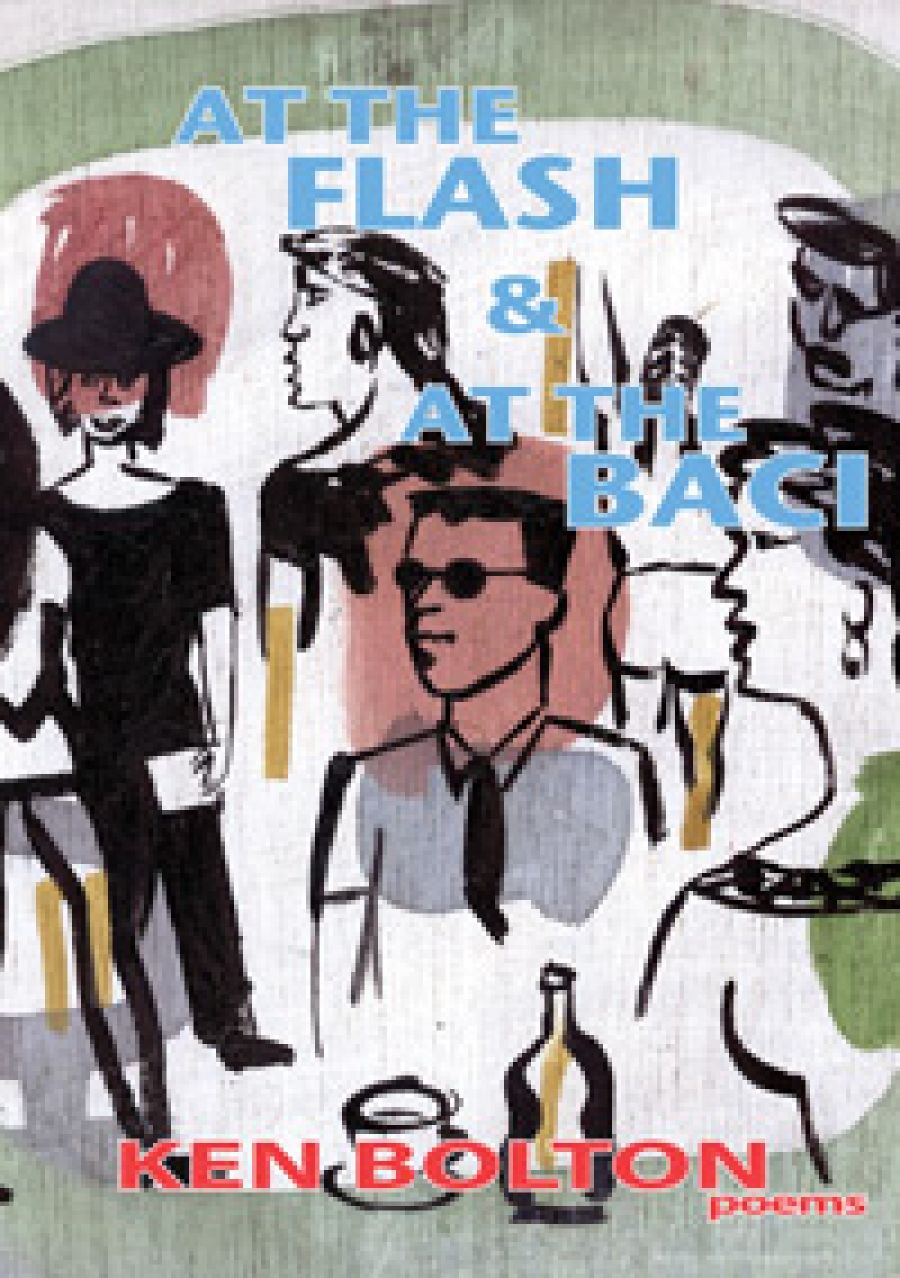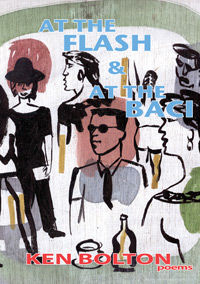
- Free Article: No
- Contents Category: Poetry
- Review Article: Yes
- Article Title: The Boltonic world
- Online Only: No
- Custom Highlight Text:
I learnt today, while being read Ken Bolton’s poetry aloud by a friend (a native South Australian), that Hindley rhymes with ‘kind’ and not with ‘wind’. My friend spontaneously started reading to me and couldn’t stop. It runs on, this K.B. speaking voice: compulsive, South Australian, poetic, paranoid, poignant, funny. One way of describing the experience of reading Bolton is that you feel like you are an outsider, looking in at the window, nose pressed against the glass, and inside are all the poet’s friends: children, loved musos, long-term waitresses, artists, favourite poet-heroes. But then K.B. tells you that he is the perpetual outsider, too, solipsistic, meditative. My friend chose, almost randomly, the poem ‘Mostly Hindley Street’, with its wide lines rolled out across the page – in turn witty, desultory, intertextual, local and cosmopolitan – each daring you to take them too seriously, to miss the flipness, daring you to take K.B. seriously, as poet, or person. He might be just like his references (he suggests) – that old prig Thomas Gray, for one, who ‘never spoke out’:
- Book 1 Title: At the Flash & At the Baci
- Book 1 Biblio: Wakefield, $24.95 pb, 224 pp, 1862546924
- Book 1 Cover Small (400 x 600):

- Book 1 Cover (800 x 1200):

noting the
weather
the arrival of the first grasshoppers
& emendations to various lexicons
– his fear of giving his
first lecture:
& which he never gave —
still …
Yes
‘prig’ came to mind —.
Bolton is a poet who just could provoke a reader to run, mad, into the surrounding desert. Here is this book of words – in turns laconic, whirling, self-deprecatory, arch, super-intertextual, daggy – coming at you. And you either get alongside at the next table in the coffee shop, or you run screaming from the detail of all that self-consciousness, that very particular Boltonic world of art, and poets, and Adelaide, and longing.
Bolton sees, in American Tony Towle, one of his favourite poets (Towle to rhyme with soul), ‘the agency of arranging and re-arranging self-conceptions’ (Bolton’s Overland review essay of Towle’s The History of the Invitation: New and Selected Poems 1963–2000). And that is what you get here, too: a man who takes time – time experienced as exquisite, ephemeral, eked out in lunch hours at the café – to take poetry seriously. There are the many glancing tributes to other poets, not just admired ‘works’ but lived, often visited textual beings: New Yorkers Frank O’Hara pre-eminently, and Tony Towle, and the Australians: John Forbes, Laurie Duggan, Pam Brown, John Jenkins. You will be one of those who goes running, mad, if you find K.B.’s attention to the history and particularities of contemporary poetry precious and clubby. Sometimes it is. But if you go with the casual ardour of this poet’s dedication to art, camouflaged as it so often feels it must be, then this (Australian) man’s commitment to poetry begins to reveal itself as vocation, necessity, survival, love. What can poetry be? What can it do, written in snatches at lunchtime, in the cafés of ordinary, familiar Hindley Street?
The poetry immerses itself – not grandiloquently, but attentively, sometimes anxiously, in the ways of being which art enables – the new realism-style colours of a dull Hindley Street day; the ‘very Richard Estes view from the café; “my friends / like ghosts in Adelaide”’, and life a series of open letters to poet friends in Rome, Brisbane, and 1950s New York. Often, the knitting together of these lexical, visual, remembered strands of being produces a jauntiness: ‘Tune in / to my mind and this is what you get – an endless / reel of jump cut images’ (‘Romans, Two’); or ‘my mind’s slumming // to see the syntax do its purl and plain, concepts linked / like carriages of a train … / The things I mean to say / get endlessly deferred’ (‘Romans, Two’). But just as often, undergirding, there are the more poignant notes of fatigue or loss, the miming of an impossible desire to peel back the endless references and intertexts, the staginess:
Old Travestere …
It felt unreal,
Too beautiful, too seedy, too glamorous and
like a privilege unearned and not to be enjoyed.
I mean, I like it but I liked it best devoid
of people – early mornings. The stage-set feel,
then, was beautiful …
Is one unselfconscious, at last, or unambivalent
merely – not conscious of divided opinion,
thinking one thing: it is beautiful?(‘Romans, Two’)
The question mark is a double agent here, of desire and the endless deferral of the answer, the realisation that the consciousness is always divided, always questioning. Nothing here is ever ‘merely unambivalent’. That would not be enough. ‘Unselfconscious, at last’ is unliveable in K.B.’s world. The book is a self-conscious, witty, sometimes flip paean to culture. Culture as ephemeral as life, as necessary to being as friends, words, time, familiarity, change, doubt. What makes the poetry so readable beyond mere ephemerality is that it is certainly the work of a poet of vocation.
Ken Bolton’s poetry has its edges of self-pity, and even the high notes of the bard. But K.B.’s is a weathered, self-mocking, delicately haunted kind of poetry, the product of relative material poverty, bouts of informed daydreaming, regrets, and a fierce, brave, poetic way of being alive, of being a poet.


Comments powered by CComment